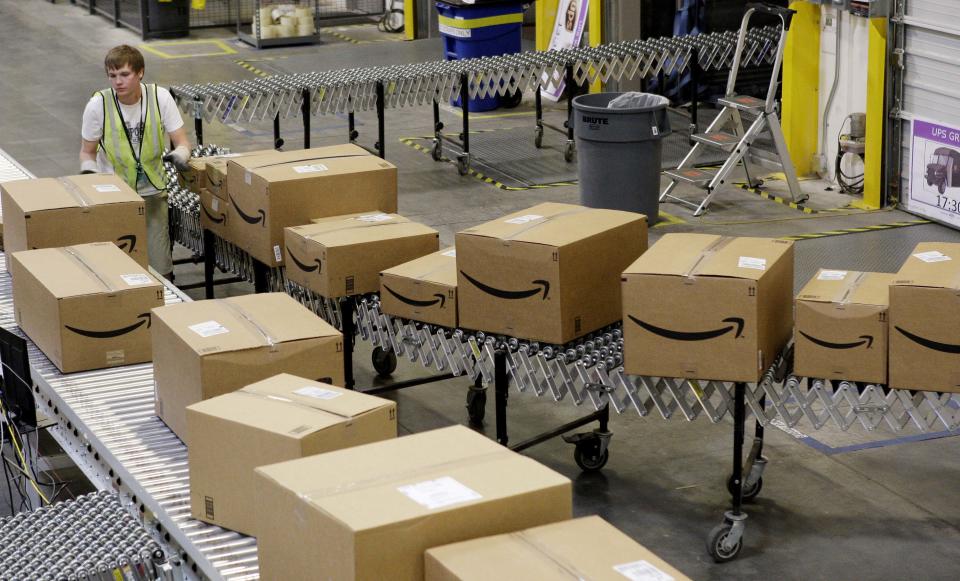Doncaster, Hemel Hempstead and Gourock sites to close as well as seven delivery sites, as retailer prepares two new facilities
Amazon has announced plans to shut three of its 30-plus UK warehouses and seven small delivery sites, affecting more than 1,300 jobs.
Workers from the large warehouses in Doncaster, Hemel Hempstead in Hertfordshire and Gourock in western Scotland will be offered roles at other Amazon locations.
It is thought unlikely that many of the 300 workers at the Gourock site will want to relocate as there is not another Amazon facility nearby, as is the case with the Doncaster and Hertfordshire fulfilment centres.
Staff from the seven delivery sites, which each employ at least 20 people working with van drivers taking items to homes, are expected to move to other sites nearby. Facilities in Huntingdon, Horley, Newcastle, Birmingham and Hemel Hempstead will permanently close while old sites in Portsmouth and Aylesford will shift to new buildings nearby.
The closures of the older sites come as Amazon prepares to open new delivery warehouses in Peddimore in the West Midlands and Stockton-on-Tees, County Durham, which will employ 2,500 people.
Steve Garelick, an organiser for the GMB union, described the announcement as “a real kick in the teeth for Amazon staff who worked themselves into the ground during the festive rush”. He said: “Hard-up Amazon workers can’t suddenly be expected to up sticks and move to a different fulfilment centre which may be many miles away. Local workers may not be in a position to take roles so far away from where they live.”
Amazon said the company remained “committed to our customers, employees, and communities across the UK”.
The Labour West of Scotland MSP Katy Clark described the closure of the Gourock warehouse as “devastating for the local community and the 300 workers who may find themselves out of a job”.
She called on the Scottish government to intervene to support the workers back into employment and said there needed to be “full transparency” over how much it had given the online retailer in the past. “Amazon has benefited from significant public funds over several years from the Scottish government,” she told the PA news wire.
The Scottish government described the move by Amazon as “very disappointing”.
A spokesperson for Amazon said: “We’re always evaluating our network to make sure it fits our business needs and to improve the experience for our employees and customers. As part of that effort, we may close older sites, enhance existing facilities, or open new sites, and we’ve launched a consultation on the proposed closure of three fulfilment centres in 2023.”
Amazon announced last week that it planned to cut 18,000 jobs around the world, mostly in its head offices, in an effort to become more efficient under Andrew Jassy, who took over as chief executive in summer 2021.
The changes come as shoppers rein in spending and the online retailer faces global economic uncertainty. The company took on staff in recent years as it expanded into new fields, including groceries, own-label technology and fashion.
Costs at Amazon’s warehouses and delivery operations have risen as shortages of workers, especially for skilled roles such as drivers of forklift trucks and heavy lorries, have forced the company to increase pay.
Workers at the company’s depot in Coventry plan to go on strike on 25 January demanding pay of £15 an hour, after securing a historic yes vote in a ballot for industrial action.
… we have a small favour to ask. Millions are turning to the Guardian for open, independent, quality news every day, and readers in 180 countries around the world now support us financially.
We believe everyone deserves access to information that’s grounded in science and truth, and analysis rooted in authority and integrity. That’s why we made a different choice: to keep our reporting open for all readers, regardless of where they live or what they can afford to pay. This means more people can be better informed, united, and inspired to take meaningful action.
In these perilous times, a truth-seeking global news organisation like the Guardian is essential. We have no shareholders or billionaire owner, meaning our journalism is free from commercial and political influence – this makes us different. When it’s never been more important, our independence allows us to fearlessly investigate, challenge and expose those in power. Support the Guardian from as little as $1 – it only takes a minute. If you can, please consider supporting us with a regular amount each month. Thank you.
If you are a writer then you can write for us
 Lifeyet News Lifeyet News
Lifeyet News Lifeyet News





